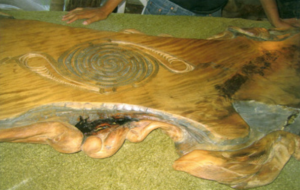Consulting local iwi
Transwaste has consulted with local iwi Te Rūnanga o Ngāi Tahu, and Te Rūnanga o Ngāi Tūāhuriri (Ngāi Tūāhuriri) particularly, throughout the life of the Landfill and the restoration of Tiromoana Bush. A formal Charter was established with the iwi in 2000 during the consenting process. Once resource consents were issued for the Landfill the Charter was updated in 2004. The Charter sets out the basis for a mutually respectful and beneficial relationship for Transwaste and Ngāi Tūāhuriri, based on the core values of each party.
Creating a lasting taonga
 During the consenting process, as part of iwi consultation, Transwaste arranged for local iwi to visit the Redvale Landfill in Auckland, to see firsthand the operation of a modern landfill. As part of the visit, a cultural exchange with Auckland iwi Ngāti Whātua took place. Transwaste consulted with Ngāti Whātua about creating a ‘taonga’ (a treasure) that could be given to Ngāi Tūāhuriri. During excavations for the Redvale Landfill, a large piece of ancient Kauri was recovered. This kauri was given to two respected local carvers to be transformed into a representation of Te Wai Pounamu (the South Island and ancestral home for Ngāi Tūāhuriri). The carved Kauri slab was mounted onto legs to form a table. In a ceremony held in November 2015, representatives of Ngāti Whātua formally presented the carved table to Ngāi Tūāhuriri.
During the consenting process, as part of iwi consultation, Transwaste arranged for local iwi to visit the Redvale Landfill in Auckland, to see firsthand the operation of a modern landfill. As part of the visit, a cultural exchange with Auckland iwi Ngāti Whātua took place. Transwaste consulted with Ngāti Whātua about creating a ‘taonga’ (a treasure) that could be given to Ngāi Tūāhuriri. During excavations for the Redvale Landfill, a large piece of ancient Kauri was recovered. This kauri was given to two respected local carvers to be transformed into a representation of Te Wai Pounamu (the South Island and ancestral home for Ngāi Tūāhuriri). The carved Kauri slab was mounted onto legs to form a table. In a ceremony held in November 2015, representatives of Ngāti Whātua formally presented the carved table to Ngāi Tūāhuriri.
Respecting values
Recognition for Transwaste’s respectful and positive attitude towards iwi consultation and engagement occurred when in 2016 representatives of Ngāi Tūāhuriri presented Gareth James, with a Pounamu mere in a woven flax basket.
In December 2018 an ika pou whenua was unveiled as part of the development of a new walkway Te Ara Matairangi and viewing platform at the coastal lookout in Tiromoana Bush. Ngāi Tahu master carver Fayne Robinson created the pou. The carvings on the pou reflect cultural values and relate to the importance of the area to Ngāi Tūāhuriri and especially values associated with mahinga kai (resources that come from the area). The opening ceremony included a karakia and a blessing of the pou performed by Makarini Rupene, Tangata Taika/Kai Taika of Ngāi Tūāhuriri.


